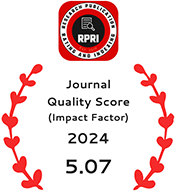Effect of Salvia officinalis and Zingiber officinaler Extracts on Some Physiological and Biochemical Parameters of Mice
DOI:
https://doi.org/10.55544/jrasb.2.1.7Keywords:
Salvia officinalis , Zingiber officinaler extracts, physiological parametersAbstract
Background Sage and ginger are considered from the medicinal and aromatic herbs and as a treatment method in traditional medicine a variety of diseases and is also used as a spice for cooking. Methodology The treatments were divided into three groups for each extract of the plant extracts of sage and ginger. The first group was dosed with sage extract at the rate of 0.5 ml per day for thirty days and the second group with alcoholic extract after disposal, of alcohol in the same quantity and the latter was left without a control dose. The same process was repeated on the ginger plant, then the blood was drawn and the amount of sugar was measured in all the groups Blood was drawn a month after the mice were infused with plant extracts, and some tests were conducted that included checking blood sugar, cholesterol, triglycerides, urea and creatinine. The present study showed significant decrease in the level of blood sugar between 60 to 64 mg/100 for ginger plant and sage aqueous extract respectively, compared to the control group 110 mg/100 ml. Ginger and sage aqueous extract also significantly reduced the level of urea in the blood to 18.21 mg /100 ml compared to the control 40 mg / 100 ml. The present work found that both sage and ginger have a vital role in the treatment of various damage and diseases. This may well be a type of treatment as drug role.
Downloads
References
AL-AMERI, Hadeel A. Testing of Volatile Oils Activity Extracted from Different Medicinal Plants Against Some Fungi Isolated from Different Sources. JOURNAL OF EDUCATION AND SCIENCE, 2021, 30.3: 2-22.
AL-AMERI, Hadeel A. Testing of Volatile Oils Activity Extracted from Different Medicinal Plants Against Some Fungi Isolated from Different Sources.
OZRUDI, M. F. Effect of Resistance Exercises with Salvia Officinalis Supplementation on the Response of Some Bio-Hormones in Overweight Male Students. Ann Clin Med Case Rep, 2021, 6.12: 1-5.
MOHAMMED, K. A. A.; WASFY, A. A. F.; BAZALOU, M. S. Qualitative analysis of ethanolic extract of ginger (Zingiber officinale Rosc) by gas chromatography triple quad time-flight (GC-Q-TOF) technology. Research Journal of Pharmacy and Technology, 2021, 14.8: 4307-4313.
AL-DULAIMI, Khadiji Khleaf; AHMED AL-TAEE, Karama Tahreer; SALIH, Thaer Abdulqader. Comparison of Histological Changes in Mice Infected with the Cryptosporidium Parvum after Treatment with an Aquatic Leaf Extract of Salvia Officinalis, Pimpinella Anisum and, Spiramycin Drug. Indian Journal of Forensic Medicine & Toxicology, 2021, 15.2.
JONAS, Michaela; SCHIEBERLE, Peter. Characterization of the Key Aroma Compounds in Fresh Leaves of Garden Sage (Salvia officinalis L.) by Means of the Sensomics Approach: Influence of Drying and Storage and Comparison with Commercial Dried Sage. Journal of Agricultural and Food Chemistry, 2021, 69.17: 5113-5124.
ISHMURATOVA, M. Yu, et al. Microscopic Evaluation of Salvia stepposa Des.-Schost above-ground part widespread in Kazakhstan. Research Journal of Pharmacy and Technology, 2021, 14.9: 4773-4776.
BABAEEKHOU, Laleh; GHANE, Maryam; ABBAS-MOHAMMADI, Mahdi. In silico targeting SARS-CoV-2 spike protein and main protease by biochemical compounds. Biologia, 2021, 1-19.
SHAREEF, Saja Majeed, et al. The protective effect of Zingiber officinale L. extract on kidney tissues and blood factors of kidney functions after the damage caused by Azathioprine. ScienceRise: Pharmaceutical Science, 2021, 4 (32): 78-86.
JAHAN, Rownak, et al. Zingiber officinale: ayurvedic uses of the plant and in silico binding studies of selected phytochemicals with more of SARS-CoV-2. Natural Product Communications, 2021, 16.10: 1934578X211031766.
JAHAN, Rownak, et al. Zingiber officinale: ayurvedic uses of the plant and in silico binding studies of selected phytochemicals with more of SARS-CoV-2. Natural Product Communications, 2021, 16.10: 1934578X211031766.
TAVAN, Mansoureh, et al. Triterpenic and phenolic acids production changed in Salvia officinalis via in vitro and in vivo polyploidization: A consequence of altered genes expression. Phytochemistry, 2021, 189: 112803.
RAGHAV, Neera; SHARMA, Manishita R. Ginger (Zingiber officinale Roscoe): A mini-review of constituents and biological activities. Chemistry & Biology Interface, 2021, 11.3.
NANDI, Sudam, et al. Quality composition and biological significance of the Bangladeshi and China ginger (Zingiber officinale Rosc.). Journal of Microbiology, Biotechnology and Food Sciences, 2021, 2021: 2283-2290.
VASAVADA, Hiral; INAMPUDI, Sailaja. Minimal Inhibitory Concentration and Minimal Bactericidal Concentration of Peppermint (Mentha piperita) extracts against standard microorganisms. Research Journal of Pharmacy and Technology, 2021, 14.9: 4662-4666.
Downloads
Published
How to Cite
Issue
Section
License
Copyright (c) 2023 Banan R. Dabdoub, Haitham L. Abdulhadi

This work is licensed under a Creative Commons Attribution-NonCommercial-NoDerivatives 4.0 International License.


















